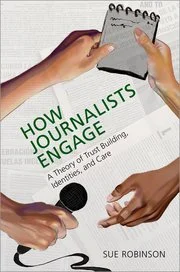Sue Robinson’s Books
Book 3:
How Journalists Engage: A Theory of Trust Building, Identities, and Care
Oxford University Press, 2023
A unique theory of trust building in engagement journalism that proposes journalists move to an ethic of care as they prioritize listening and learning within communities.
In How Journalists Engage, Sue Robinson explores how journalists of different identities enact trusting relationships with their audiences. Drawing from case studies, community-work, interviews, and focus groups, she documents a growing built environment around trust building and engagement journalism that represents the first major paradigm shift of the press's core values in more than a century. As Robinson shows, journalists are being trained to take on new roles and skillsets around listening and learning, in addition to normative routines related to being a watchdog and storyteller. She demonstrates how this movement mobilizes the nurturing of personal, organizational, and institutional relationships that people have with information, sources, news brands, journalists, and each other. Developing a new theory of trust building, Robinson calls for journalists to grapple actively with their own identities and to develop a more intentional and effective news practice centered in an ethic of care.
Offers a theory of trust building in journalism and explains what engagement journalism is
Includes data from in-depth interviews, focus groups, surveys, and first-person accounts
Documents the new roles and skillsets necessary for journalists to build trust with different kinds of audiences
Book 2:
News After Trump: Journalism's Crisis of Relevance in a Changed Media Culture (Journalism and Political Communication Unbound)
Authors: Matt Carlson, Sue Robinson, Seth C. Lewis
Oxford University Press, 2021
Donald Trump might have been the loudest and most powerful voice maligning the integrity of news media in a generation, but his unrelenting attacks draw from a stew of resentment, wariness, cynicism, and even hatred toward the press that has been simmering for years. At one time, journalism's centrality in reporting and interpreting important events was relatively unquestioned when a limited number of channels and voices produced a consensus-based news environment. The collapse of this environment has sparked a moment of reckoning within and outside journalism, particularly as professional news outlets struggle to remain solvent. Alternative voices compete for attention with and criticize the work and motivations of journalists, even as a growing number of journalists question their core norms and practices.
News After Trump considers these struggles over journalism to be about the very relevance of journalism as an institutional form of knowledge production. At the heart of this questioning is a struggle to define what truthful accounts look like and who ought to create them or determine them in a rapidly changing media culture. Through an extensive accounting of Trump's relationship with the press, and drawing on in-depth interviews with journalists and textual analysis of news events, editorials, social media, and trade-press discussions, the book rethinks the relevance of journalism by recognizing the limits of objectivity and the way in which journalism positions certain actors as authority figures while rendering the less socially powerful invisible or flawed. This ethos of detachment has staved off vital questions about how journalism connects to its audiences, how it creates enduring value in people's lives (or not), and how diversity needs to be understood jointly at the level of production, reporting, and audience in order to rebuild trust.
Provides a book-length account of Donald Trump and far-right politicians' relationships with the mainstream press
Offers the most comprehensive scholarly accounting to date of the Trump presidency's relationship with the press
Examines the precarious place of journalism within a much larger, rapidly shifting media culture
Adopts a forward-looking position that supports journalism's role but is critical of how journalists approach political news
Points toward a future in which journalists can reassert their relevance and reclaim public trust through developing a moral voice in place of a detached objectivity
Book 1:
Networked News, Racial Divides: How Power and Privilege Shape Public Discourse in Progressive Communities (Communication, Society and Politics)
Cambridge University Press, 2018
Against conventional wisdom, pervasive black-white disparities pair with vitriolic public conversation in politically progressive communities throughout America. Networked News, Racial Divides examines obstacles to public dialogues about racial inequality and opportunities for better discourse in mid-sized, liberal cities. The book narrates the challenges faced when talking about race through a series of stories about each community struggling with K-12 education achievement gaps. Media expert Sue Robinson applies Bourdieusian field theory to understand media ecologies and analyze whose voices get heard and whose get left out. She explores how privilege shapes discourse and how identity politics can interfere with deliberation. Drawing on network analysis of community dialogues, interviews with journalists, politicians, activists, and citizens and deep case study of five cities, this reflexive and occasionally narrative book chronicles the institutional, cultural and other problematic realities to amplifying voices of all people while also recommending strategies to move forward and build trust.
Tracks how information flows through a media ecology being reconstituted by social-media platforms, applying field theory.
Explains why some voices are heard in mainstream information patterns while some voices challenging the status quo are not—even in highly progressive places.
Provides a series of real-world, realistic recommendations for any professional communicator facilitating public dialogues about race and racial disparities.
Engages with the concept of community trust and explores how to build trust among groups where distrust reigns.
Utilizes and explains network ethnography, a mixed, robust, and relatively new methodology for tracking information in local communities.


